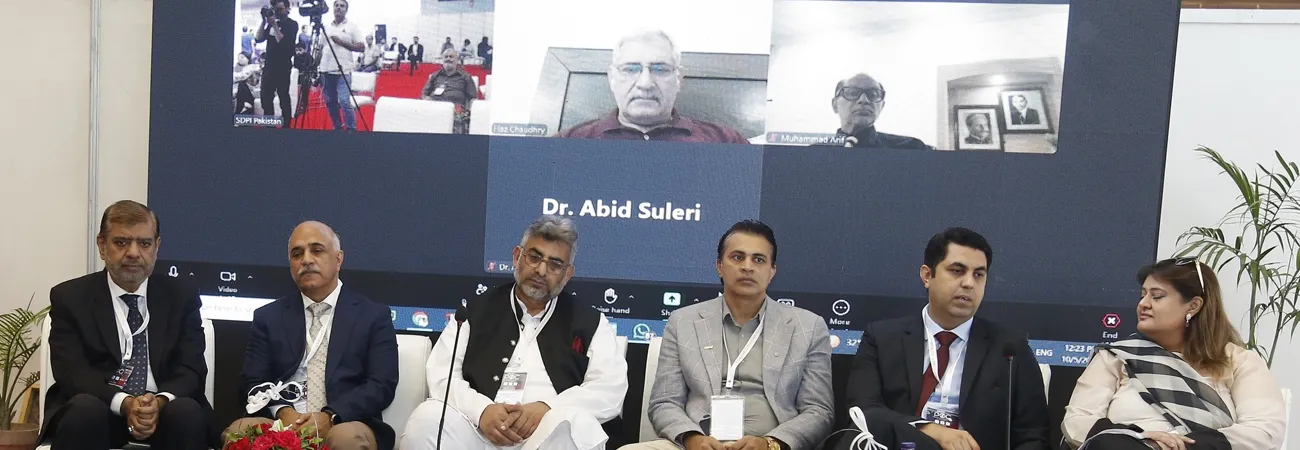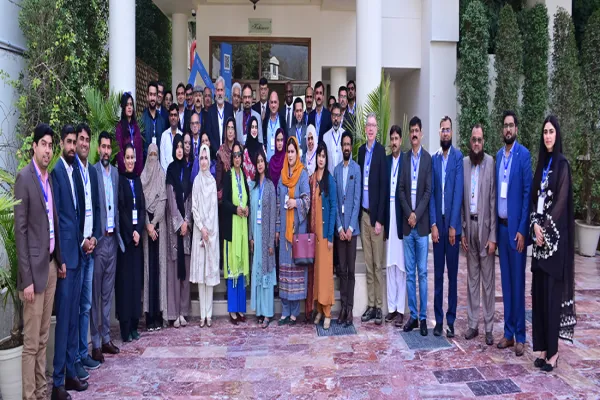i NEWS PAKISTAN
The Asian Development Bank (ADB) convened industry leaders and government officials at a pivotal conference focused on enhancing regional integration through digital trade, with an emphasis on addressing climate and health challenges. The two-day conference has been organized by the ADB in collaboration with the Sustainable Development Policy Institute (SDPI) here at a local hotel.
The first day of the conference hosted Minister of State for Information Technology and Telecommunication, Shazia Fatima Khawaja who highlighted significant growth of 25% in tech exports and government endeavours of providing financing to the youth to scale E-entrepreneurship initiatives and youth led startups.
The notable speakers at the second day inaugural session included Lyaziza Sabyrova, Regional Head, CWRD, ADB, Syed Aftab Haider, CEO of Pakistan Single Window (PSW), and Wahat Bastimiyev, CEO of Verigram. In her opening remarks, Lyaziza Sabyrova, Regional Head, CWRD, ADB briefed the participants on CAREC program which was stated almost two decades with them vision to integration, reformation and transition in the central Asian countries' economies.
The program has diversified strategy focussing transport, energy, economic corridors, and agriculture sectors and water resources.
The program, she said helped in human development including education and health with broader focus on digitalization, gender and climate change. Sayed Ashraf Siddiqui, Joint Secretary, Economic Affairs Division and CAREC National Focal Point in Pakistan said the role of technology is important to promote and enhance regional trade whereas the conference also intends to foster digital trade across the region.
It is also the foundation step of the implementation on the digital strategy 2030 that emphasizes upon the technology in promoting regional trade through reducing barriers and enhancing connectivity across various sectors, he said. During the conference, Syed Aftab Haider emphasized the transformative power of technology in global trade. He noted the significant growth of merchandise trade and the surging e-commerce landscape. "Digitalization is the way forward, encompassing both technology and procedures. Pakistan Single Window has implemented a digital platform across all land, air, and dry ports, significantly reducing the bureaucratic footprint," he said.
Verigram’s Wahat Bastimiyev shared insights on Kazakhstan’s digital landscape, highlighting a remarkable increase in non-cash transactions and the swift opening of bank accounts. "With internet penetration at 92% and cashless payments making up 89% of transactions, Kazakhstan is witnessing a banking transformation that can enhance cross-border e-payments," he noted.
The panel discussion featured prominent figures including Dr. Manzoor Ahmad, former ambassador, and permanent representative of Pakistan's Mission to World Trade Organization (WTO) who advocated for Pakistan's participation in modern trade agreements that prioritize gender and climate change. He pointed out that Pakistan collects only 50% of taxes from its international trade, a stark contrast to the global average of less than 5%.
Mohammad Shoaib Zafar, National Advisor, International Trade Centre (ITC) called for a cultural shift within the prevailing trade system, emphasizing the need for capacity building among consumers and traders. Engineer Ahad Nazir highlighted the importance of initiatives like PSW, urging for their expansion and integration with other government systems to enhance data governance and cybersecurity.
Dr. Usman Qadir, Senior Research Economist, PIDE underscored the need for the government to promote PSW and improve data accuracy for effective policymaking, stating that Pakistan must accelerate its technological advancements in the trade sector. The panel discussion concluded with a call to action for policymakers to adopt a holistic approach to trade, prioritizing technological integration and collaboration across sectors to foster sustainable growth in the digital era. The second panel discussion moderated by Syed Ali Wasif Naqvi, Head Center for Health and Policy Innovation, SDPI hosted Dr Shahzad Ali Khan, Vice Chancellor Health Services Academy and Dr Minhaj ur Siraj, Former Joint Executive Director, PIMS.
Dr Shahzad Ali Khan said the digital transformation has transformed the previously interpersonal systems making them more liberal and progressive like emergence of telehealth medicine, AI algorithms based hospital management system and others.
CAREC countires have a very unique health system where patient and doctor are the decision makers. The progress and growth of digital health is very slow even in the developed countries. The community based health services through digital platforms is totally a different scenario. The psyche of patients and physical interaction is critical for treating humans which is a challenge and the digital applications should be devised after consultations with doctors and patients while understanding their psyches, he added.
Pakistan will be the leader and biggest beneficiaries of one health roll out in CAREC countries due to it's well trained health human resource of trade and connectivity improves between the countries, he said.
Pakistan used digital health platforms in real time to manage the COVID-19 pandemic that was efficient, proactive and effective to contain pandemic control decision making and efforts, he said.
The same digital health platforms can be used for addressing other disease spread as the biggest research in future will be on infectious disease control digital health platforms that can provide disease spread details in less time, he added.
Transparency and governance systems need to be improved to embrace digital transformation which promotes accountability and fairness, he said. No government across the developed countries are providing health services as they are mostly focussed on management and governance, evaluation and monitoring systems, he added.
Dr Minhaj ur Siraj said the digital era is ushering us towards universal health which primarily hinges on communication, coordination and collaboration among countries. "Hospital management is a critical issues whereas procurements and management a painstaking component that all depends on their supply chains. The main supply chain issues data safety is the biggest challenge in the public sector. Blockchain and internet of things have eliminated the data security concerns in the prevailing times," he said. Dr Siraj emphasised the need to incorporate private sector in one health and digit health transformation.
The third panel discussion was moderated by Dr Khalid Waleed, Research Fellow SDPI participated by Dr Abid Qaiyum Suleri, Executive Director SDPI, Bilal Anwar, CEO, NDRMF, Sobiah Becker, Pak-German Climate and Energy Partnership, GIZ and Kazim Saeed, CEO Pakistan Agriculture Coalition. Dr Abid Qaiyum Suleri said there are four prerequisites for policy making including institutional arrangement, financial allocation, relevant human resource, and technological solutions. Digital transformation and connectedness cannot alone be addressed by a single policy but rather intersectoral policies ensuring seamless transition and connectivity, he said.
A holistic approach is required to ensure minimum disruption of supply chains, he added. Blockchain provides us immutable data sets and such technology solutions provide real-time, traceable and advanced information critical for policy and decision making, he said, adding," We need to ensure transparency in the system to ensure redressal of data protection and security concerns." Bilal Anwar said supply chains are the first affected during disasters like the 2022 floods made it difficult to approach impacted communities.
The solution lies in the technology that has not been exploited completely due to different reasons, he said.
The data compilation, risk assessment and needs assessment collation is the first step to ensure efficient response, he said. The AI and advanced technological solutions have enhanced the access to communities which needs to be incorporated in the digital transformation, he said. The NDRMF CEO underlined that communication between relevant agencies was a major challenge that can be addressed through AI and technology solutions.
A recent National Catastrophe Model (NATCAT) has been developed by the NDRMF enriched with data from multiple data sources and departments to come up with a unique IT based solution for disaster forecast, disaster risk reduction, and realistic evidence based picture to decision makers and all relevant players, he added He underscored that modern tech-based solutions require combination of various data sets and analytics enabling informed complete picture of a particular sector. Sobiah Becker explained the forum on the Pak-German Partnership supporting Pakistan in achieving climate resilience and energy transition including integration of technological solutions in the existing systems using Internet of Things to make them smarter services and systems.
The Carbon Border Adjustment Mechanism (CBAM) is incredibly important for Pakistan and making textile industry more climate resilient with smaller carbon footprint and CBAM compliant, she said. CAREC goals are ease of communication, efficiency of procedures and quality improvement whereas Pak-German Partnership is working on a portal providing climate related information for farmers and all other relevant stakeholders for better decision making which is open and accessible to all, she added.
Kazim Saeed provided insights on an internet of things-based smartphone solution to manage tubewells supplies for farmers providing a less capital intensive and commerical scale solution that is the way forward to achieve resilience in agriculture sector. The moot ended with a unanimous call for extensive efforts to embrace technology and modern solutions for enhancing collaboration, connectivity and communication channels among the CAREC states and the region to enhance benefits of most modern solutions ensuring trade for climate and health solutions.
Credit: Independent News Pakistan (INP)









